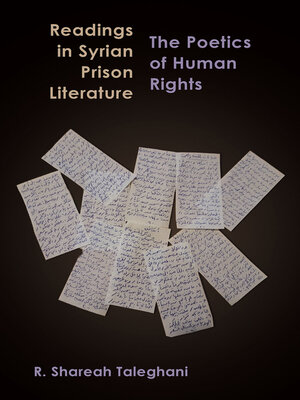Readings in Syrian Prison Literature
ebook ∣ The Poetics of Human Rights · Contemporary Issues in the Middle East
By R. Shareah Taleghani

Sign up to save your library
With an OverDrive account, you can save your favorite libraries for at-a-glance information about availability. Find out more about OverDrive accounts.
Find this title in Libby, the library reading app by OverDrive.



Search for a digital library with this title
Title found at these libraries:
| Library Name | Distance |
|---|---|
| Loading... |
The simple act of inscription, both minute and epic, can be a powerful tool to bear witness and give voice to those who are oppressed, silenced, and forgotten. In the eras of Hafiz al-Asad and his son Bashar, Syrian political dissidents have written extensively about their experiences of detention, both while in prison and afterwards. This body of writing, largely untranslated into English, is essential to understanding the oppositional political culture among dissidents since the 1970s—a culture that laid the foundation for the 2011 Syrian Revolution. The emergence of prison literature as a specific genre helped articulate opposition to authoritarian states, including the Asad regime. However, the significance of Syrian prison literature goes beyond a form of witnessing, expressing creative opposition, and illuminating the larger cultural and historical backstory of the Syrian uprising. Prison literature, in all its diversity, challenges the narrative structures and conventional language of human rights. In doing so, prison literature has played an essential role in generating the "experimental shift" in Arabic literature since the 1960s. Taleghani's groundbreaking work explores prison writing's critical role in resistance movements in Syria, the evolution of Arabic literature, and the development of a global human rights.







